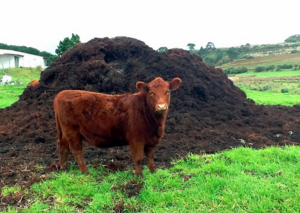
Well rotted manure from certain species can be used in gardens to give plants a much-needed nutrient boost. The supplementation provided by nutrients obtained from animal manures can help plants to stay healthy, strong and free of disease, and even plant pests in some cases. Manures also add organic matter to the soil.[1]
This article is basic and needs to be built upon; add your knowledge to help it expand.
Adding manure to garden plants[edit | edit source]
Water the area well before adding. Water the manure into the soil as well as you can. Add mulch after the manure has been watered in.
Types of manure suitable for the home garden context[edit | edit source]
Cow manure[edit | edit source]
This manure must be well rotted and old before using as a garden helper.
It is a useful source of nitrogen and humus. Once added, it will slowly release its nutrients. It will also condition soil and can help to retain soil moisture.
Use with annuals, vegetables, no-dig gardens, roses and many native species of plants.
Poultry manure[edit | edit source]
This manure contains many sources of proteins. As with cow manure, it releases the nutrients slowly. It should not be placed close to plant roots though, as the urine content may burn the roots.
Use on vegetables and citrus plants.[2]
Horse manure[edit | edit source]
- See also: Horse manure
Horse manure is high in nitrogen. It will release this slowly into the soil.
Use this leaf vegetables, shrubs and roses.
Sheep manure[edit | edit source]
This is a great manure because it's not smelly.[2] It's also affordable in countries that have high sheep populations.
It is low in nitrogen, hence is less likely than the other manure types to burn plants.[2] It is high in phosphorous and potassium.[2] It is slow release and can be used as mulch.[2]
Compost heap[edit | edit source]
Horse and cow manures can be added to the compost heap as well.[2] Heat treated manure (via the heat in the compost) can be useful for easier transportation and easier broadcasting over specific planted areas.[1]
Caution[edit | edit source]
Animal manure is best and safest used well rotted and old, as fresh manure can carry bacteria (such as e. coli) and other possible pathogens that may harm human health.[1] Another benefit of older, well cured manure is that it won't smell as much as when it's fresh. However, there are some benefits to use of fresh or raw manure, such as higher nitrogen content, but very careful and knowledgeable handling is required, so do your research first.[1]
In all cases, do not allow the manure to touch the plant stems. Keep it in a circle around the plant, not on the plant.
Be aware that grass seeds may be in some manures, especially from hay eating animals.[3] If sourcing commercially, seek reassurance that it is weed-free.
Do not use cat or dog manure; the diseases in their feces can be all too easily passed on to human beings.[3]
Sources and citations[edit | edit source]
- ↑ 1.0 1.1 1.2 1.3 http://www.extension.umn.edu/garden/fruit-vegetable/using-manure-and-compost/
- ↑ 2.0 2.1 2.2 2.3 2.4 2.5 https://my.extension.illinois.edu/documents/915090809090909/www-gardeningtipsnideas-com_2008_03_the_many_benefits_of_sheep_manure-h.pdf
- ↑ 3.0 3.1 https://www.uaf.edu/files/ces/publications-db/catalog/anr/LPM-00340.pdf